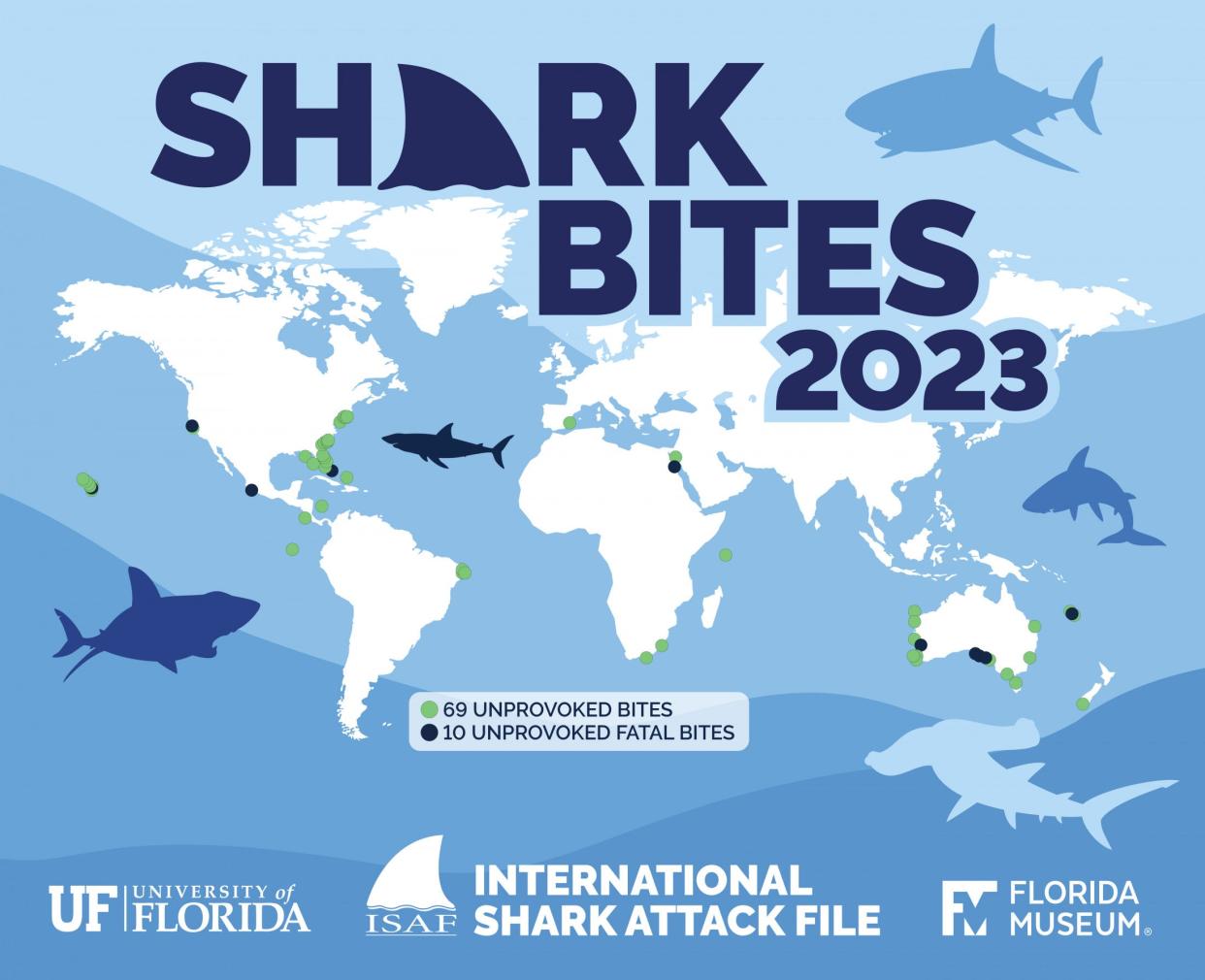Shark bites are up in 2023, report says; Florida, Volusia County top list again

The University of Florida released today a report outlining worldwide locations of unprovoked shark attacks last year.
And similar to recent years, Volusia County topped the nationwide list of most shark bites.
There were 69 unprovoked shark attacks in 2023 worldwide, according to the University of Florida’s International Shark Attack File, up from 57 in 2022; however, the number is consistent with the five-year average of 63.
Of those 69 incidents, the U.S. leads all other nations with 36; Florida leads all U.S. states with 16; and Volusia County leads all Florida counties with eight.
Shark bites in Volusia: Why do sharks swim near people? And why are bites rarely fatal?
The jump from 57 bites reported in 2022 is not an indication of a growing trend, according to Gavin Naylor, director of the Florida Program for Shark Research with the Florida Museum of Natural History. The number of bites every year typically fall between the 55-80 range.
“As a scientist I am somewhat surprised that they are as consistent as they are,” Naylor said of the annual number of bites. “These are natural processes, random events, which happen to be when people are in the water, where there are sharks in the water — I would think that the variance would be much higher. But in fact, it is remarkably steady.”
He said the 10 fatalities reported last year doubled from 2022, “with a disproportionate number occurring in Australia,” which had four fatalities, even though the country “accounted for 22% of all attacks,” according to the report.
“Sometimes we just get a statistical blip, and it could be one of those, but we have got our eye on it, because it might not be,” Naylor said.
Why does Volusia County see more shark bites than anywhere else?
The impressive all-time lead Volusia County holds over every other county in Florida — 303 bites against Brevard’s 147 — is due to a “confluence of many factors,” Naylor said.
“You only get shark bites when there is a lot of people in the water, a lot of sharks in the water, the sharks are trying to feed on things, and they do not have good visibility,” Naylor said.
In the Ponce Inlet, New Smyrna Beach areas, where there is a “really nice surf break,” the high surfing activity also plays a role in the situation.
“And because there is lots of surf, there is lots of energy, and where there is lots of energy there is lots of silt churned up, and where there is lots of silt churned up the visibility is very poor,” he added.
There is also “a ton of baitfish” in the area, Naylor said, which attracts hungry sharks.
“And what do they come across? A whole bunch of surfers with their legs and arms dangling over the side, and they are looking for fish, they can’t see very well, and they somebody’s feet splashing around, and they go ‘Oh, there’s one.’”
Volusia County has been in the top spot since 1993, according to the International Shark Attack File.
Is Florida the reason why the U.S. leads other nations in shark bites?
According to Naylor, yes.
“If you take all of the bites in the U.S., and you remove all the ones in Florida, the U.S. does not really look as if it has a lot of shark bites,” he said. “Half of them are from Florida.”
The second American state with most shark bites every year is Hawaii, followed by California, South Carolina and North Carolina.
Four states have only ever recorded one shark bite in history: Maine, Connecticut, Rhode Island and Maryland.
How can Volusia County beachgoers avoid getting bit by sharks?
Around 42% of shark bites last year were related to "surfing/board sports,” according to the report.
Surfing in Volusia County beaches comes with the risk of encountering a shark, and while he won’t give “surfers any advice,” they should be aware of the animals’ presence in the area, Naylor said.
Surfers are not afraid: Every week is Shark Week in New Smyrna Beach, but surfers remain undeterred
But for regular beachgoers and visitors to Volusia County beaches, there are steps you can take to avoid an unwanted encounter:
“Don’t wear shiny jewelry, because it catches the light like scales and sharks might think you are a mullet or something,” Naylor said. “You shouldn’t go in the water where you see lots of baitfish swimming around, especially if they are jumping out of the water, because that means something’s chasing them.”
Other advice includes:
Don’t swim on your own, which makes you an easier target for sharks.
Don’t go swimming at dawn or dusk.
Don’t go swimming where there are fishermen fishing.
For information about shark bites and sharks, visit the International Shark Attack File’s website at floridamuseum.ufl.edu/shark-attacks/.
This article originally appeared on The Daytona Beach News-Journal: Volusia County leads shark bites in the U.S. (again), report says

